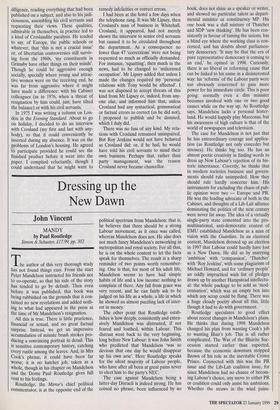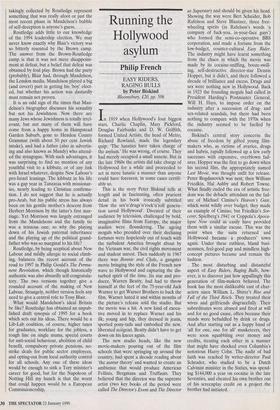Dressing up the New Dawn
John Vincent
MANDY by Paul Routledge Simon & Schuster, £17.99, pp. 302 The author of this very thorough study has not found things easy. From the start Peter Mandelson instructed his friends not to co-operate, so that his side of the story has tended to go by default. Then even before it was published, this book was being rubbished on the grounds that it con- tained no new revelations and added noth- ing to what had appeared in the press at the time of Mr Mandelson's resignation.
All this is true. There is little prurience, financial or sexual, and no great factual surprise. Instead, we get an impressive accumulation of minute brush strokes pro- ducing a convincing portrait in detail. This is sensitive contemporary history, catching every rustle among the leaves. And, in Mrs Cook's phrase, it could have been far worse; it is no hatchet job, taken as a whole, though in his chapter on Mandelson and the Dome Paul Routledge gives full vent to his feelings. Routledge, the Mirror's chief political commentator, is at the opposite end of the political spectrum from Mandelson: that is, he believes that there should be a strong Labour movement, as it once was called, whereas Mandelson does not. He also does not much fancy Mandelson's networking in metropolitan and royal society. For all that, he is on the whole content to let the facts speak for themselves. The result is a sharp reminder of two points worth remember- ing. One is that, for most of his adult life, Mandelson seems to have had simple habits of life and a low income: nothing to complain of there. Any fall from grace was very recent, and he can fairly ask to be judged on his life as a whole, a life in which he showed an almost puzzling lack of inter- est in money.
The other point that Routledge estab- lishes is how deeply, consistently and exten- sively Mandelson was distrusted, if not feared and loathed, within Labour. This distrust went back to the very beginning, long before New Labour: it was John Smith who predicted that Mandelson 'was so devious that one day he would disappear up his own arse'. Here Routledge speaks for the silent majority of Labour people, who have after all been at great pains never to elect him to the party's NEC.
The case against Mandelson being a latter-day Disraeli is indeed strong. He has coined no phrase, been influenced by no book, does not shine as a speaker or writer, and showed no particular talent as depart- mental minister or constituency MP. His one book was a dull mixture of Thatcher and SDP 'new thinking'. He has been con- sistently in favour of taming the unions, has a blind eye where the working class is con- cerned, and has doubts about parliamen- tary democracy. 'It may be that the era of pure representative democracy is coming to an end,' he opined in 1998. Curiously, there is no liberal or reforming cause that can be linked to his name in a disinterested way: his 'reforms' of the Labour party were too obviously concerned to gain more power for his immediate circle. This is poor going: normally even a dim minister becomes involved with one or two good causes while on the way up. As Routledge says, Mandelson lacks a personal hinter- land. He would happily play Maecenas, but his awareness of high culture is that of the world of newspapers and television.
The case for Mandelson is not just that he has extraordinary courage and applica- tion (as Routledge not only concedes but stresses). He thinks big too. He has an almost poetic creativity in finding words to dress up New Labour's rejection of its his- toric inheritance. Covertly, he thinks that in modern societies business and govern- ments should rule unimpeded. How they should rule hardly concerns him. His instruments for excluding the chaos of pub- lic opinion were two — Europe and PR. He was the leading advocate of both in the Cabinet, and thoughts of a Lib-Lab alliance dominating the politics of the next century were never far away. The idea of a virtually single-party state cemented into the pro- multinational, anti-democratic context of EMU established Mandelson as a man of vision with the Guardian. In an electoral context, Mandelson dressed up an election in 1997 that Labour could hardly have lost as a New Dawn. He did so by marrying `ambition' with 'compassion', 'Thatcher' with 'Roy Jenkins', with some plagiarism of Michael Howard, and for 'ordinary people' an oddly impractical wish list of pledges drawn up by another Hampstead intellectu- al: the whole package to be sold as 'mod- ernisation', which was an empty box into which any scrap could be flung.. There was a huge cloudy poetry about all this, little though it had to do with government.
Routledge speculates to good effect about recent changes in Mandelson's plans. He thinks that during 1998 Mandelson changed his plan from wanting Cook's job to wanting Blair's job. This is all rather complicated. The War of the Blairite Suc- cession started earlier than expected, because the economic downturn stripped Brown of his role as the inevitable Crown Prince. Connected with this was the PR issue and the Lib-Lab coalition issue, for since Mandelson had no chance of becom- ing Labour's choice, any move to either PR or coalition could only assist his ambitions. Whether the straws in the wind pains- takingly collected by Routledge represent something that was really afoot or just the most recent phase in Mandelson's bubble of self-deception is anyone's guess.
Routledge adds little to our knowledge of the 1994 leadership election. We may never know exactly why Blair's victory was so bitterly resented by the Brown camp. The answer from the Brown-Routledge camp is that it was not mere disappoint- ment at defeat, but a belief that defeat was obtained by foul play. Brown had the party (probably), Blair had, through Mandelson, the London media. Mandelson played a big (and covert) part in getting his `boy' elect- ed, but whether his action was dastardly must remain not proven.
It is an odd sign of the times that Man- delson's biographer discusses his sexuality but not his Jewishness. Now there are many Jews whose Jewishness is totally irrel- evant, but not many of them will have come from a happy home in Hampstead Garden Suburb, gone to Hendon County Grammar (with about 50 per cent Jewish intake), and had a father (also in advertis- ing and also known as Mandy) who attend- ed the synagogue. With such advantages, it was surprising to find no mention of any youthful visit to a kibbutz, or of any link with Israel whatever, despite New Labour's pro-Israel leanings. The kibbutz in his life was a gap year in Tanzania with missionar- ies, nearly leading to Christian confirma- tion. I do not suggest that he is actually pro-Arab, but his public stress has always been on his gentile mother's descent from Herbert Morrison by the latter's first mar- riage. Yet Morrison was largely estranged from the Mandelsons and the family tie was a tenuous one; so why the playing down of his Jewish paternal inheritance and the playing up of the political grand- father who was so marginal to his life?
Routledge, by being sceptical about New Labour and mildly allergic to social climb- ing, balances the recent account of the road to 1997 in Philip Gould's The Perrna- nent Revolution, which though historically authentic was also absurdly self-congratula- tory. The two versions together give a rounded account of the making of New Labour. Strangely, neither version feels any need to give a central role to Tony Blair.
What would Mandelson's ideal Britain be like? Routledge has obtained an unpub- lished draft synopsis of 1995 for a book which sets out his ideas. There would be a Lib-Lab coalition, of course, higher taxes for graduates, workfare for the jobless, a tough line on single mums, special courts for anti-social behaviour, abolition of child benefit, compulsory private pensions, no- strike deals for public sector employees, and opting-out from local authority control for all schools. Any one of these ideas would be enough to sink a Tory minister's career for good, but for the Napoleon of Notting Hill my hunch is that the worst that could happen would be a European Commissionershipk



























































 Previous page
Previous page